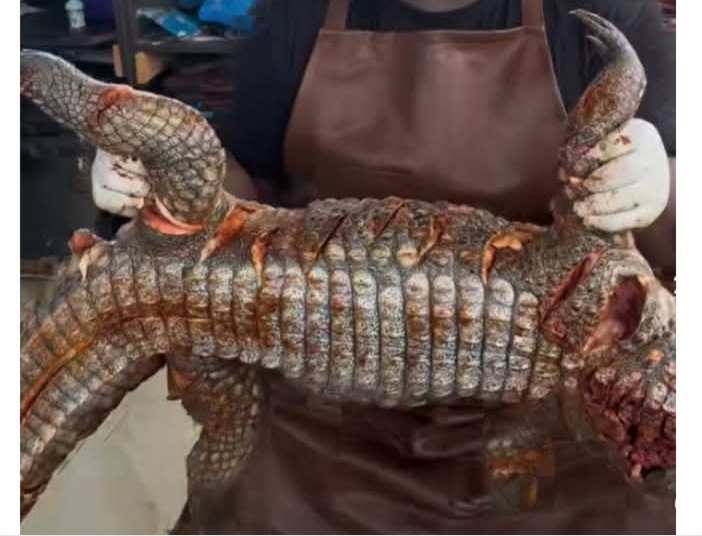Illegal And Health Risks Of Consuming Crocodile Meat In Nigeria
Illegal And Health Risks Of Consuming Crocodile Meat In Nigeria By Daniel Okonkwo
In Nigeria, the consumption of grilled crocodile meat—or crocodile meat in any form—can land you in jail. Yes, you heard that correctly. The Nigerian government has sued individuals for killing and consuming crocodiles, citing violations of environmental and wildlife protection laws.
Eating suya is considered the ultimate African street food, particularly popular in countries like Nigeria. However, in recent times, some individuals have strayed from the norm, venturing into consuming endangered animals—a dangerous practice that can have serious legal consequences.
In Nigeria, the consumption of grilled crocodile meat—or crocodile meat in any form—can land you in jail. Yes, you heard that correctly. The Nigerian government has sued individuals for killing and consuming crocodiles, citing violations of environmental and wildlife protection laws.
In cities like Abuja and Lagos, there are numerous joints where crocodile meat is openly sold, often without the knowledge of customers regarding the dangers and legal risks involved. If you are caught buying or eating such meat by government enforcement agents, you could face arrest and prosecution. Importantly, ignorance of the law is not an excuse.
Under Nigerian law, the hunting, killing, possession, and trade of crocodiles are heavily regulated. The Endangered Species Act of 1985 and the Endangered Species (Control of International Trade and Traffic) Act of 2016 provide a legal framework for the protection of threatened and endangered species, including crocodiles. Violators of these laws face serious legal consequences.
A notable case occurred at the prestigious IBB International Golf and Country Club in Abuja, where a poacher was arrested after killing a crocodile within the premises. Ironically, the danger posed to the poacher was immense, as the crocodile could have fatally attacked him.
The issue of consuming endangered species is not limited to Nigeria. At Calgary International Airport in Canada, a man was fined $7,500 after pleading guilty to unlawfully importing six pounds of African dwarf crocodile meat—a species classified as threatened. The meat was discovered by the Canada Border Services Agency during a routine inspection. Subsequent testing confirmed the species, and legal action was promptly taken under Canadian wildlife protection laws.
While the consumption of crocodile meat might not be universally illegal, it is critical to be aware of specific national and international laws and regulations. In Nigeria, although eating crocodile meat is not unlawful outright, obtaining such meat through illegal poaching or from protected species is a serious offence.
Similarly, the Convention on International Trade in Endangered Species of Wild Fauna and Flora (CITES) regulates and restricts the international trade of endangered species, including crocodiles, their skins, and their meat.
Public health experts also express grave concerns about consuming crocodile meat due to the potential risk of disease transmission. Wild-caught animals may carry zoonotic diseases, posing significant health risks to consumers.
Despite robust laws, enforcement challenges remain. Weak regulatory oversight and inadequate public awareness contribute to the continued poaching and consumption of crocodile meat in Nigeria. The growing demand for bushmeat, including crocodiles, threatens to deplete wild populations and undermine conservation efforts.
It is important to note that while the Crocodile Trade (Protection) Act of 1974 prohibits specific actions such as taking, killing, or possessing crocodiles without proper permits, it does not directly criminalise consumption. However, the legality of eating crocodile meat hinges on how the meat is sourced. If it is obtained through illegal means, consumption can expose individuals to legal consequences.
Therefore, while cultural practices and culinary interests may drive the consumption of crocodile meat in some communities, individuals must ensure that any crocodile meat they consume is sourced legally and sustainably. The increasing enforcement of CITES regulations and Nigeria’s domestic wildlife protection laws highlights the seriousness of these issues.
Consuming crocodile meat in Nigeria presents a complex web of legal, health, and conservation concerns. To avoid legal trouble and contribute to the preservation of endangered species, it is vital to verify the legality and sustainability of the meat source. As the world moves towards greater conservation efforts, individuals must act responsibly and stay informed about the legal frameworks governing wildlife protection.
This article was written by Daniel Okonkwo for Profiles International Human Rights Advocate.



